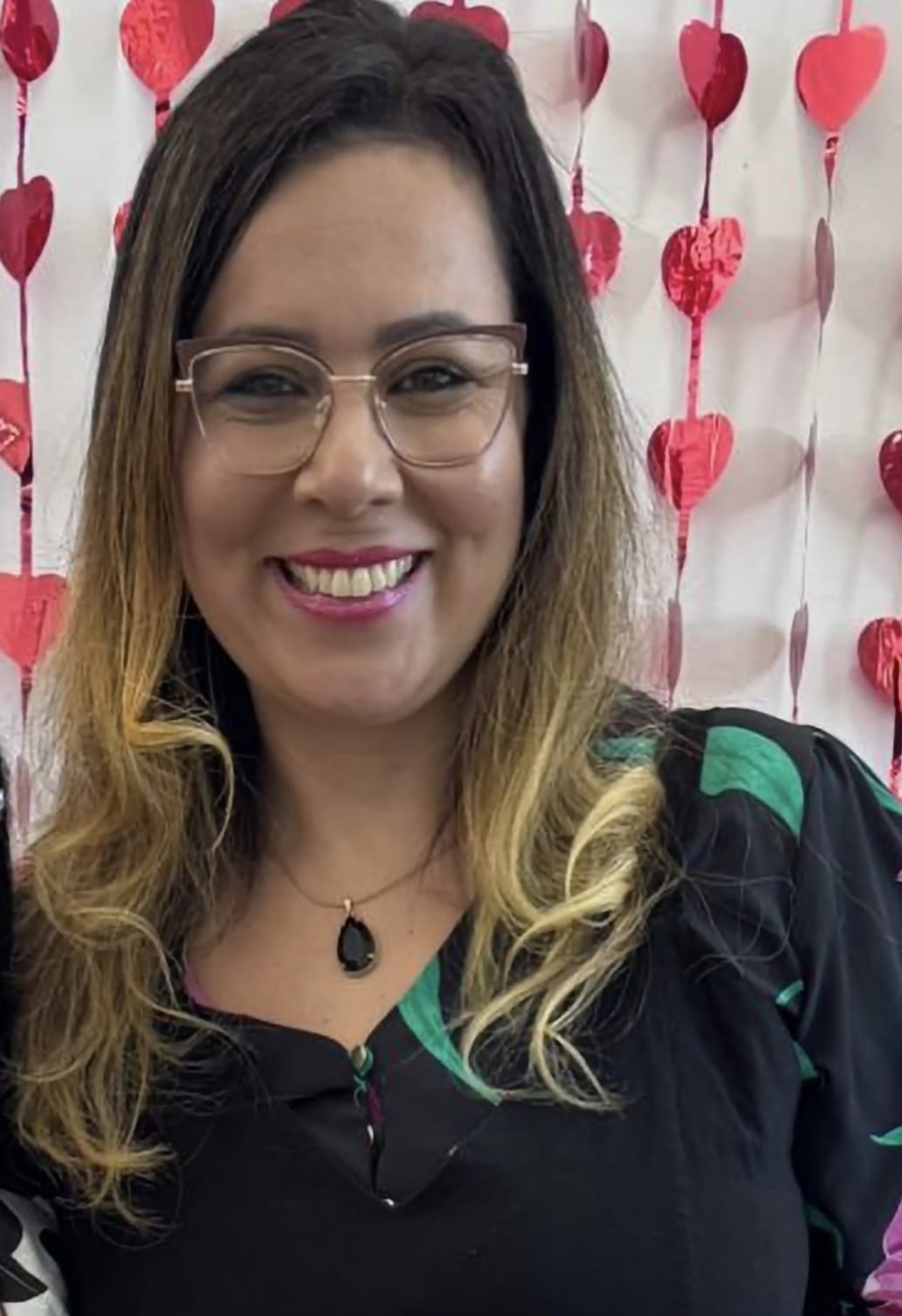-
A Crown and a Name That Will Last
 Written byBeliza Kocev, Brazil Coordinator at Iron Rose Sister Ministries
Written byBeliza Kocev, Brazil Coordinator at Iron Rose Sister Ministries I never liked my name. I wrote other names in all my childhood photo albums. I am not quite sure why this was the case, but I always felt like I had a weird and meaningless name (even in Portuguese, Beliza is not a popular name). No one else had that name, and everyone asked where it came from.
I also never liked my last name. In Brazil, Silva is a very common last name. Today, I recognize that I just wanted to feel special, and having a super common last name went against my desire. Throughout my childhood and early adolescence, I made plans to change my name at the registry office when I turned 18. I made plans to marry a man with a long last name so mine would be “special.”
I did neither.
I continue to be Beliza, and today I like that my name is unusual and that my mother dedicated time and thought to choosing my name (in fact, creating it)! Beliza is a rearrangement of my grandmother's name IZA-BEL -> BEL-IZA). And even when I got married, Silva remained (the registry office did not allow me to remove my last name— only to add my husband's name which, by the way, is not as long as I had imagined, ha-ha).
Whoever has ears, let them hear what the Spirit says to the churches. To the one who is victorious, I will give some of the hidden manna. I will also give that person a white stone with a new name written on it, known only to the one who receives it. (Rev 2:17 NIV)
I will receive a new name— I don't know what it will be yet— but like a father who chooses the name of his children, God will give me a new name, remembering that I am an adopted daughter and a part of His family— a name much more special than Beliza— an eternal name.
In the Scriptures, we see that a name is more than just a combination of letters. It is a representation of the essence of the person who bears it. When we say, “in the name of Jesus,” we are talking about Christ Himself, not just a combination of letters. “And I will do whatever you ask in my name, so that the Father may be glorified in the Son. You may ask me for anything in my name, and I will do it”(Jn 14:13-14).
In addition, giving someone a name was a symbol of the authority one had over that person. Adam named the animals (Ge 2:19), and God had already said that Adam would rule over them (Ge 1:26-28). Joseph and Mary did not choose the name of their son— it was up to God to decide that He would be called Jesus (Mt 1:21). From time to time, we see God changing someone’s name as a symbol of a new status, as was the case of Abraham (from Abram), Sarah (from Sarai), and Israel (from Jacob).
A new name, a new status, a new identity.
May we have the strength and courage to remain firm in faith and receive our new name and crown: “Everyone who competes in the games goes into strict training. They do it to get a crown that will not last, but we do it to get a crown that will last forever”(1Co 9:25).
I don’t know whether you like your name or not, but knowing that our Father chooses an eternal name for us should make us grateful for His care and affection for us. It should help us remember that there is no greater love than this—to be called children of God. May we keep this in our hearts until the day the words of Revelation 22:4 are fulfilled: “They will see his face, and his name will be on their foreheads.”
-
An Example of “She Did What She Could”
 Written byMarbella Parra, volunteer for the Iron Rose Sister Ministries in Honduras
Written byMarbella Parra, volunteer for the Iron Rose Sister Ministries in Honduras As we read the Bible, we find many exemplary stories of women who, with what they had in their hands, did important things that influenced the lives of others and left a mark on eternity. In the New Testament, we find the story of a woman who anointed Jesus with a very expensive perfume, and when criticized by those around her for "wasting the perfume," Jesus defended her by saying, "She did what she could" (Mk 14:8 NIV). He recognized her sincere dedication and her willingness to give the best she had, regardless of the criticism of others. No more was demanded of her than what she could offer, but her act of love and devotion was recorded as an example for all. These words resonate as a reminder that God is not calling us to do the impossible but to be faithful with what we have, whether it be our time, talents, resources, or efforts. It's about living with an attitude of surrender and trusting that God uses every little act done with love for His glory.
As women of God, we have been challenged to put wisdom into practice in our daily lives, as Matthew 7:24 says: "Therefore everyone who hears these words of mine and puts them into practice is like a wise man who built his house on the rock.". Wisdom is not simply accumulated knowledge, but action based on divine truth.
The woman who anointed Jesus did not wait for perfect timing or approval from others. She simply acted with love and gratitude. In the same way, each of us has daily opportunities to do what we can with what God has placed in our hands. Perhaps it is a word of encouragement, a prayer, an act of service, or a personal sacrifice that, although may seem small, has a great impact on the Kingdom of God.
In my case, my mother has been a great example in this regard. She taught me that even though I had no experience working with children, I could serve in children's ministry and learn how to develop my gifts for God. She taught me that even though I didn't have the gift of public speaking, I could teach other young women and girls with my life and teachings. She taught me that the Lord could use me in His work if I would make my life available to Him. So, I can say that she was an example to me that, although she didn't have all the gifts that she thought she needed, her love and willingness to serve God were greater; she always strived to give what she could and was within her reach for God.
I am sure that each of us strives daily to give the best to God, and we must value that to continue motivating ourselves to do better each time according to the abilities we have. Today, I want to encourage you to think about the things we are giving to God and never underestimate our effort and dedication, as long as it is with selfless love.
Practicing wisdom as a woman of faith involves building on the rock, making decisions with discernment, and acting courageously. It is not a matter of having everything figured out, but of moving forward with what God has given us at this moment. At the end of our day, may we hear in our hearts the Lord's sweet affirmation, "She did what she could," knowing that every act done with love and obedience has eternal value.
What can you do today with what you have in your hands to honor God and bless others?
-
Follow Me as I Follow Christ
 Written byClaudia Malaquias, volunteer with Iron Rose Sister Ministries in Minas Gerais, Brazil
Written byClaudia Malaquias, volunteer with Iron Rose Sister Ministries in Minas Gerais, BrazilThere is a fable about two donkeys who were walking to make deliveries, one with a load of sugar, and the other with a load of sponges. After walking for a while, they came across a fast-flowing river.
The donkey with the load of sponges said, “How will we cross? What if the river takes us?”
To which the other responded, “Nothing is going to happen! Follow me and you will see that we are safe.”
As he entered the river, his load of sugar dissolved and, becoming lighter, made the crossing easier. “What did I tell you? Now follow my example and come!”
But, to no surprise, as the other donkey entered the river, the load of sponges swelled with the water, became much heavier, and the current carried the poor animal away.
It is human nature to seek to belong to a group and to do so we often succumb to social influences, which experts call conformism: the passive acceptance of norms, rules, customs, and ideas that shape behavior without any reflection on our part. Therefore, following others without due diligence can result in serious consequences!
When I was first converted, still inexperienced in the Word, I tried to join one of the women's small groups in my congregation just by observing how they presented themselves. Following human instincts, I chose a lively, talkative group that was well-informed about everything that was happening in the church.
However, with time and maturity, I realized that the spiritual fruits that I needed to grow were not really being practiced there. The apostle Paul’s phrase: “Follow my example, as I follow the example of Christ” (1Co 11:1 NIV) is an invitation to imitate him, who clearly reflected our Lord, Christ Jesus, the perfection of love and sacrifice, while at the same time warning us to keep company with those whose choices are guided by God’s will.
At each step of our journey in the Kingdom, we need to direct ourselves to imitate those who have already matured in faith—people who show in their lives the fruits of the Spirit that we may still need to polish in our lives. In this way, little by little, we too will be an example for other brothers and sisters.
Paul felt confident in inviting others to become disciples of Christ by following his example. Do we have the same courage?
Knowing the Scriptures, developing intimacy with God through prayer, meditating on the life of Christ, and obeying His commandments are important for deepening our faith and communion with the Holy Spirit. With these practices as the load we carry, we will be an example for others, and it will become easier to discern good examples for us to follow as well.
In the fable of the donkeys, the mistake was to imitate without considering the load of each one. Sometimes that can be our mistake, too. May we seek our spiritual growth each day through the imitation of those who truly practice the example of Christ.
-
Listening in Small Groups
 Written by Lisanka Martínez, volunteer with Iron Rose Sister Ministries in Venezuela
Written by Lisanka Martínez, volunteer with Iron Rose Sister Ministries in VenezuelaWhen we read in Ephesians 4:29 "Do not let any unwholesome talk come out of your mouths, but only what is helpful for building others up according to their needs, that it may benefit those who listen" (NIV), it is necessary to keep in mind that it is a command for all Christians in all times, places, and circumstances. Because of this, we notice the commitment that it represents to be able to express ourselves, as the Word indicates, so that our speech is edifying for those who listen to us, always avoiding the opposite.
This commitment, I confess, has been an uphill struggle for me on several occasions, and incredibly more so in my life as a Christian. Before I studied the Word, when I read or listened to this verse, it seemed to me to be directed at people who were mean in their language, uncontrolled, or who always spoke with malice and double meanings, offending and mocking others. I thought it was not addressed to me, who, although I said a bad word from time to time, tried to be careful where and to whom I said it, being respectful of the people with whom I had some contact.
Later, as a Christian, I remember an anecdote that happened to me during a discipleship class in which I participated shortly after being baptized.
I arrived 15 minutes early to the meeting set for 8 a.m. and I found only the sister in charge of the class who had been there since 7:30 a.m. The rest of the group arrived in a span of half an hour. Much later, the sister who led the class was the last to arrive with another of the sisters. When I asked them what had happened to them and why they were so late, the accompanying sister told me that it was the time the person in charge had told her because they needed to wait until everyone was there before beginning.
I was very upset, and I let the leader know that I thought it was disrespectful for her to arrive almost an hour late to start the class. My attitude had its immediate response: her face was transformed, and she spent the next half an hour sharing an improvised lecture (with its corresponding biblical passages) in which she explained why a neophyte like me should not call out a more mature woman in the faith. I listened to her speech quietly, still upset, and then we finally moved on to the prepared class material. Of course, nothing she said convinced me that she hadn't disrespected all of us. Being Venezuelan, I should have been used to that characteristic of many of my compatriots: the failure to comply with schedules and the lack of respect for others' time; however, I was not and still am not.
Reflecting on this experience, I now think that she, with more experience in the faith, should have simply apologized to everyone for being late and told me, the insubordinate one, that we would talk more calmly about the subject later, instead of showing that she was in charge and that the rest of us should respect and obey her. In conclusion, we both failed as friends, sisters, and group members.
How many of you have had something like this happen? (I remember a story shared by our sister Michelle where she related a similar experience involving a church trip to the beach, found in the book, In God’s Right Hand). Fortunately, those experiences now seem very distant, and we remember them more objectively, although for everyone in the group that day, it would not have been edifying despite the use of the Bible and the fact that no corrupt words were used.
Studying Social Work, I learned about what it means to be in a group and even more so if we formed a team: the commitment, the level of confidentiality, and cohesion that this implied. It should have been a piece of cake to transfer that to my church groups many years later. However, experience has shown me that I have failed in my commitment to God and to the members of the group because of the way I am, always trying to give instructions about the right way to do or say things without being loving, understanding, and compassionate enough in most cases. My commitment is not only to teach, but also to listen and show the greatest empathy, and I want my face and gestures to reflect the love of Christ and not just my words. Now, I work daily to correct and change with God's help.
Do you hear yourself and your sisters in your small group showing love?
-
Mentorship Story
 Written byKarol Diogo, volunteer with Iron Rose Sister Ministries in Rio Grande do Sul, Brazil
Written byKarol Diogo, volunteer with Iron Rose Sister Ministries in Rio Grande do Sul, Brazil Caring for people is one of the main examples Jesus left us as a way to continue His work, if not the main one: raising up men and women according to His biblical principles.
Paul mentored many people, but it was with Timothy that this work stood out most clearly. The image of a mentor shines through in 1 and 2 Timothy, especially at the beginning of 2 Timothy. There is great richness in mentoring.
I've been mentored by a sister in the Church of Christ for four years. Allowing myself to be mentored by her has been an incredible turning point in my life and my spiritual life. I believe we should all go through this experience. I see this all throughout the Bible. Jesus did this with the apostles for three years, teaching them both theory and practice, just as the apostle Paul did with Timothy, and it produced great results.
We can see these examples in 2 Timothy 2:1-2 and 2 Timothy 3:10-17. If we follow these examples that Paul left us, we will be following Christ's examples for our Christian life.
May we be GIVERS in our Christian walk (people who help others altruistically, prioritizing the well-being of others, even if it means personal cost). May we interact with each other based on the teachings of God's Word in our interpersonal relationships. In Ephesians 4:12-16, Paul speaks of the purpose of the church being built up is that all may attain unity in the faith and the knowledge of Christ. He further explains in 1 Corinthians 10:24, "No one should seek their own good, but the good of others”(NIV).
Establishing an intentional relationship with God, setting aside time regularly to be alone with Him, is our first priority. If I am faithful to God, I will be faithful to everything He asks (1Co 4:2).Keeping the Word alive within us so we can pass it on to others is a basic Christian principle we cannot forget. This practice is fundamental to the spiritual life, and neglecting it can lead to superficiality and other harm.
God's faithfulness and love offer us security, as Paul teaches us in Romans 8:31. Therefore, if we are faithful to Christ, we will be faithful in everything. This way, we can help others in need of a mentor, just as Paul needed Barnabas, and Timothy needed Paul's guidance. Sister, one day someone will need you—and me too. Therefore, let us be prepared for that moment, mirroring Christ, Paul, Barnabas, and so many others in the Bible who left this teaching.
I learned the importance and responsibility of having a mentor in my life. We know that our greatest mentor should always be Jesus Christ, but a suitable sister in our lives is also important, as we see in Proverbs 11:14.
What I learn, I immediately put into practice. Just as God teaches us, Paul passed his wisdom on to Timothy, and my mentor passes her wisdom on to everyone she teaches. I want to leave these words of encouragement to all: Always be faithful to God, and we will be faithful in everything we do. Never forget the teachings of our Lord and practice them, for poor are those who know but do not practice them.
Seek a Christian mentor, learn their teachings, and put them into practice.This way, you'll become a mentor in the future, helping other sisters. Dedicate yourself to God and to others. People are very important to God, and if they're important to Him, they must be important to us too. John 3:16 reminds us of this. Today, I mentor four sisters, to the honor and glory of our Lord Jesus. Learn, practice, and teach others.
May God always continue to bless us. May His name be glorified and exalted forever and ever. Amen.
-
Practice like a Wise Woman
 Written by Michelle J. Goff, Founder and Executive Director of Iron Rose Sister Ministries
Written by Michelle J. Goff, Founder and Executive Director of Iron Rose Sister MinistriesTherefore everyone who hears these words of mine and puts them into practice is like a wise man who built his house on the rock. (Mt 7:24 NIV)
In the conclusion to His Sermon on the Mount, Jesus reminds us of the importance of putting His teaching into practice, learning then practicing as His followers. It’s like building a house on the Rock. Women’s hands, aged with wisdom, and their voices in children’s classes have shaped this refrain into a memorable song with actions, hand motions, and a simple tune. No one wants to build his house on the sand because we know that it came crashing down when “the rain came down and the floods came up.”
Even today, when the storms of our lives threaten to tear us down, we must cling to the words of Christ and build, or rebuild, our lives on the Rock.
Last year as a ministry, we highlighted various ways in which we are called to live “Committed to Christ, 24/7 in 2024.” With the release of the latest small group Bible study book, we affirmed that we are Committed to Listen. Now that we have “heard these words of [His],” we must turn our attention to putting them into practice, like wise women.
James 1:5 promises that if we ask for wisdom, God will provide it. Those with more life experience can testify to the fact that wisdom is acquired over time. We learn from our failures. We grow through the struggles. Everything we face in life—every thought, action, reaction, and words that do or don’t come out of our mouths—everything provides an opportunity for us to put Jesus’ words into practice.
Fulfilling God’s teaching takes practice. I didn’t learn to play the piano or do a cartwheel on a balance beam overnight. Both activities took practice. As a child, I played many wrong notes, and I fell off the beam on more than one occasion. Today, I can still do a cartwheel, but I haven’t attempted it on a balance beam. These days, I can only remember a few very basic songs on the piano. Why? I stopped practicing.
What are examples from the Christian life that require practice?
Practicing implies failure and grace. Learning a language is a challenge. For some people, it is easier to hear the unique sounds, comprehend the grammar, and learn the vocabulary. Yet no matter what your language-learning ability, you must begin by speaking like a child, imperfectly and incorrectly. You will never perfect the language without giving yourself permission to make mistakes and learn from them.
What have you learned from making mistakes as a Christian?
This year, on Tuesdays (only once/week), we will share biblical and personal stories about how we can build our lives on the Rock, put Jesus’ words into practice, and practice as wise women.
We want to encourage you to use these blog posts as guides for small group discussion, in person or virtually. There will be questions for good conversation and, at times, additional Bible verses for further study.
Let’s practice encouraging each other as wise women! In honor of New Year’s, through our social media channels, share a teaching you want to put into practice this year (maybe through a New Year’s resolution or key word for the year). Alternately, share an example of an area that you want to practice with others.
If you are looking for inspiration, I recommend reading the Sermon on the Mount (Mt 5-7) or ordering Committed to Listen as a 40-day devotional that facilitates dedicated listening, thus learning more about what God is guiding you to put into practice (Mt 7:24).
-
Praying Like Jesus Did Based on John 17
 Written byJo Gower, volunteer with Iron Rose Sister Ministries in Arkansas
Written byJo Gower, volunteer with Iron Rose Sister Ministries in Arkansas This could be a world changer: praying more like Jesus day by day.
Christ Jesus is the Intercessor of all Intercessors. In John 17:1-26 we read that He prayed for Himself, for His disciples, and for us (all believers).
Prayer for Himself
Father, the time has come. Glorify your son, that your Son may glorify you.(Jn 17:1 NIV)
This is not prideful or selfish. We can read what happened leading up to this Passover meal, He had gotten up from the table to begin the process of washing the disciples’ feet. He wanted them to see how far His love would go (Jn 13). He shared with them that it was time for Him to leave the earth but consoled them explaining that He would send the Holy Spirit as their mentor.
Prayer for His Disciples
Jesus prayed aloud for them and their difficult future. No doubt He knew His disciples would not have a chance against Satan until He was glorified (Jn 7:39).
Being glorified? It will prove that Jesus fulfilled His (and man’s) destiny. It liberated humanity from Satan’s dictatorship. It put mankind positioned over Satan for the first time since Adam and Eve abdicated. Then the Holy Spirit could come to the infant church's aid with supernatural power.
Being glorified forever reversed the degraded condition of the whole human race. Adam’s fall brought shame, sin, and Satan’s oppressive rule. But Jesus brought life and immortality to light through the gospel.
Jesus, the last Adam, placed Himself between hell and humanity. In Jesus, God became man and picked up the fallen battle flag that once flew as a symbol of man’s rule over the creation, the flag that fell along with Adam and Eve. Jesus took that flag and raised it again and was glorified… on our behalf! (Heb 2:5-18).
So, Jesus’ prayer for glorification isn’t silly selfishness. It is the same prayer He taught His disciples earlier: “Hallowed be your name, your kingdom come, your will be done” (Mt 6:10). As always, the Father’s will was Jesus’ prime request. And it’s the Father’s will that one man be glorified on our behalf.
Should we pray to be glorified also?
Yes!!! Paul wrote that, in God’s eyes, we’re already glorified by His grace (Ro 8:30). In the Father’s mind, we’ve already been raised to sit with Jesus in the heavenly realm; this allows Him to “show us off” to the angels and the dark supernatural world. He proves to them that He, not Satan, is truly God and deserves worship (Eph 2:6-10).
So, by Christ’s unselfish work, we share in His position. When He was glorified, so were we. His prayer, “Glorify your Son,” made our glorious destiny a reality.
Jo Gower’s John 17 Personal Prayer Story
For the last few years, I’ve been part of a group that prays over our neighborhood schools. After praying year after year, I decided it was time for a refresher course.
John 17 seemed the perfect prayer to refresh my prayers. It’s Jesus' longest prayer recorded in God’s Word. My desire was and continues to be to intentionally focus on praying more like Jesus. It has helped me to read Christ's prayer slowly and experience its majestic heights—the Son talking with His Father.
I was reminded that Jesus was praying for the church's deliverance from Satan's power. This incredible prayer still protects God's church from the evil one today. It is powerful to pray this same portion of John 17 over our friends, families, communities, and schools.
I sent out a text to some prayer partners to renew our commitment to pray for the local school for another year. I encouraged them to use John 17 as a model: Jesus asks for our protection from the evil one in verses 11 and 15. He prays for our unity in verses 21-23. He even asks the Father to sanctify us (to set us apart for His holy service) in verses 17-18.
How would you bloom in your prayer life after learning to pray like Jesus did?
-
Praying Through the Common Threads
 Written byKatie Forbess, president of Iron Rose Sister Ministries Board
Written byKatie Forbess, president of Iron Rose Sister Ministries Board As iron sharpens iron, so one person sharpens another. (Pr 27:17 NIV)
During this exciting month of prayer, we are working our way through the prayer calendar. This is a wonderful way of blessing the ministry. There are so many areas covered for us to think about and pray for together. In this way, many of us are able to pray for the people in our lives by breaking into topics and using scripture.
Another way of praying is to pray through the Common Threads, for yourself or someone else. This, to me, is one of the best resources of IRSM. They are so important that they are incorporated into each of the blog posts. Using them in small groups or even in everyday conversations helps to fulfill the mission of IRSM, which is to help women grow closer to God and to one another. We can use the three parts of the logo as a guide to evaluate what’s going on with ourselves. Then we can transform that into a prayer of our own. Additionally sharing the information with others allows you to pray for each other. That’s awesome!
A Bloom - Which of us doesn’t want a friend to pray for the aspirations of our lives? Reading about wisdom, as it is our theme for this year, makes me want to really grow spiritually in that area, and therefore I want to share that with others so that they can hold that desire up in prayer.
A Thorn - We all have them, and we know it. What an awesome blessing to have the confidence of another sister to share with.
An Iron - The three parts of the logo are very special, but the one that really has proven critical to my long-lasting friendships is the iron sharpening iron piece. I suggest you have friends you can ask to hold you accountable to your aspirations to become more like Jesus. Have a friend who can ask the hard questions and make you face a reality that you are struggling to face.
Michelle often says we are the epitome of Iron Rose Sisters. We have been that for almost 30 years. That means we share and “ooh and ahh” in all the right places as we see each other grow spiritually and become the women that God created us to be (THE ROSE).
This has happened through many seasons over the last 30 years— ups and downs of life that lead us through valleys and to high mountains all bathed in the prayers of each other, knowing each other's thorns and being able to navigate them, helping each other navigate difficult moments, and prayerfully removing or at least dulling the sharpness of them (THE THORN).
Michelle is the one I call when I know she will know before I finish saying what I am saying, and what prayers I need. I don’t have to apologize for being myself, but I can be assured that if what I am saying needs some reality and a biblical lens that I’m not looking through, she will provide those. And vice versa! We can and do say things to each other to hold each other accountable and to help each other dig deeper into areas of our lives that need attention (THE IRON).
 Using the Common Threads, we decidedly pray for each part of this tool and then place them in God’s hands, not our own. There is no room for power struggles or power trips or manipulation when you hand it over to God. That’s a special relationship. That’s an Iron Rose Sister relationship.
Using the Common Threads, we decidedly pray for each part of this tool and then place them in God’s hands, not our own. There is no room for power struggles or power trips or manipulation when you hand it over to God. That’s a special relationship. That’s an Iron Rose Sister relationship. My prayer for you today is for you to use the Common Threads to pray for yourself as well as other Iron Rose Sisters. I pray they will become part of your daily personal reflections and your conversations with other sisters while you are sharing prayer requests.
Question - Do you know and understand the parts of the Common Threads well enough to make them a part of your daily life?
-
Trust and Obey
 Written by Rianna Elmshaeuser, volunteer with Iron Rose Sister Ministries in Colorado
Written by Rianna Elmshaeuser, volunteer with Iron Rose Sister Ministries in ColoradoChristian movies often end with the characters, who have trusted and obeyed God despite the circumstances, getting everything they want: a baby, a spouse, money, whatever. I’m not criticizing those movies because that frequently does happen, but it also doesn’t always happen that way. What do we do when we don’t get everything we want? Is it worth it? I can tell you from the perspective of someone who didn’t get the desires of her heart, it is still worth it to trust and obey God.
All my life I have loved kids. I so badly wanted my own kids to hold and sing to and teach and watch grow up. Unfortunately, I never married. I could not afford adoption or a residence big enough to appease the State requirements for a foster child. So here I am, age 40 and skipping all the church baby showers because they are just too painful. Along the way, I received more than a few recommendations to go to a sperm bank (use a donor) and have a baby by myself. But I had a problem with that. I believe God designed the family to have a mother and a father. And as badly as I wanted to be a mother, I felt that if I went around His plan and intentionally brought a child into a fatherless home, I would be disobeying God. Just because you can do something doesn’t mean you should. Taking in a foster child was an exception in my book because I was not the one who brought them into the world. They are kids that don’t have anyone to love them, and one person would be better than none.
To most of society, this is a crazy position to take. I connect deeply with Hebrews 11:13, “All these people were still living by faith when they died. They did not receive the things promised; they only saw them and welcomed them from a distance, admitting that they were foreigners and strangers on earth” (NIV).
My obedience to God may not bring me what I want, but I trust in God with all my heart that His way is better than mine. I am not single by my own design, but I have found 1 Corinthians 7:34 to be true: “An unmarried woman or virgin is concerned about the Lord’s affairs: Her aim is to be devoted to the Lord in both body and spirit.” My singleness and childlessness have given me time to help with the youth group, coach the kids in puppet ministry for Lads 2 Leaders, start a singles ministry, volunteer at nursing homes and other places, make time for lunch or coffee with people who need encouragement, and many other things that bring about a sense of fulfillment.
I have learned to embrace my status in life and trust that God has a plan for me because of Jesus’ example. He trusted His Father, our Father, to the point of death. When Jesus was in the garden, He was praying for God to find another way, to take the cup from Him. But in His perfect obedience, He said, “Not my will, but yours.”
As badly as I want children, I am trusting God’s plan even though I may never see the results in my lifetime. Hebrews 3:7-8 says, “So, as the Holy Spirit says: ‘Today, if you hear his voice, do not harden your hearts as you did in the rebellion, during the time of testing in the wilderness’.” Everyone at one time or another faces a choice to obey God or do their own thing. I had a friend in college who rebelled, had two kids while unmarried, and then repented and came back to the Lord. The thought did cross my mind that I could do that too. But trusting in God means also trusting that the consequences for rebelling to get what I want and then repenting will not be better than if I obeyed Him in the first place.
During my time of testing, I did not rebel, but did my best to emulate Jesus and say, “I don’t understand, but Your will, not mine.” Through the pain and sorrow, God has made changes in my heart that I could never have imagined possible. I have a light in my heart that I didn’t know was missing and a relationship with Jesus that is deeper than ever before. He has also set me on a path to help lots of hurting kids rather than my own. I am excited for the future. Despite the likelihood that there will always be times I don’t understand, and I will still mourn the children I never had, I trust my Father to bring about something better.
-
What You Have Learned or Received or Heard from Me…
 Written by Brenda Brizendine, Assistant Director of Iron Rose Sister Ministries
Written by Brenda Brizendine, Assistant Director of Iron Rose Sister MinistriesFinally, brothers and sisters, whatever is true, whatever is noble, whatever is right, whatever is pure, whatever is lovely, whatever is admirable—if anything is excellent or praiseworthy—think about such things. Whatever you have learned or received or heard from me, or seen in me—put it into practice. And the God of peace will be with you. (Php 4:8-9 NIV)
The Bible instructs us to think about good things—things that build us up. Why? Because our thoughts affect our attitudes, our moods, our perception of ourselves, and even our relationships. Our thoughts are tied to our joy, our happiness, and, in general, the quality of life we live.
A few months ago, I started studying the book Who Has the Last Word? written by Michelle J. Goff, with the women in the congregation I attend. This book reminds us that we can use the truth of God's Word to cut through the lies that Satan or we ourselves have placed in our minds or hearts. In it, Michelle teaches us that by remembering the truth of God's Word, memorizing it, and internalizing it in our hearts and minds, we begin a transformation process that allows us to realize the abundant life we can have in Jesus, a life that Satan desires to steal from us.
Last year, as part of the commitment I made to Christ, I chose Psalm 46:10 to study, understand, and live by. Wow, God knew that I would need to be “still” to face all the situations that arose in my life and family! But He knew better than I did that, beyond being still, I needed to remember that He is still God and the Lord over every circumstance.
I enter 2025 with unanswered questions, unresolved situations, and transitions to face, but I am ready to continue practicing living in the truth that God has left in His Word. I will stumble and doubt, definitely, but by returning to His Word, evaluating my thoughts, and deliberately choosing to think on “whatever is true, whatever is noble, whatever is right, whatever is pure, whatever is lovely, whatever is admirable—if anything is excellent or praiseworthy,” I will be able to practice being a wise woman.
Romans 12:2 says: “Do not conform to the pattern of this world, but be transformed by the renewing of your mind. Then you will be able to test and approve what God's will is—His good, pleasing, and perfect will.” The next time you notice you’re thinking negative thoughts, choose to replace those thoughts with the truth of God's Word. For example, if you think about giving up, look for the truth in the Word and decide to meditate on verses like Deuteronomy 31:6, Galatians 6:9, and Philippians 4:13. Or when the enemy tries to convince you that you don’t deserve love, remind him of what God says about you in Psalm 139, Jeremiah 1:5, or Romans 8:38-39.
Learning to control your mind can be like trying to tame a wild animal. But the Lord says: “I will instruct you and teach you in the way you should go; I will counsel you with My loving eye on you” (Ps 32:8). Keep practicing: rely on God and keep asking Him for help to know His truth. You will begin to see changes—changes that will affect other areas of your life, and “the God of peace will be with you.”
Now, with what you’ve learned:
- Share a truth from God’s Word in which you want to grow or bloom (put it into practice).
- Identify a lie you wish to remove with the truth from God’s Word.
- Identify a sister who can be like iron sharpening iron in your life and can remind you of the truth you chose in point 1.
See more photos on our Photo Gallery page.
(c) Iron Rose Sister Ministries. Site setup by Perfect Fit Web Design; Flag icons by Free Flag Icons

